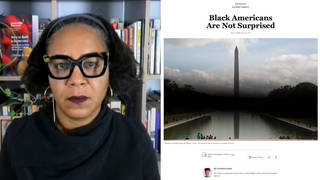
Part 2 of our conversation with The Intercept’s Matthew Cole on Erik Prince, the founder of Blackwater. In a major new report, Cole takes a look at Prince’s latest actions, including his pitch to privatize the war in Afghanistan; his creation of a mercenary army for the United Arab Emirates; a history of mismanaged projects that have soured his relationships with leaders around the world; and his comeback, made possible with the help of the Trump administration.
Transcript
AMY GOODMAN: This is Democracy Now!, democracynow.org, The War and Peace Report. I’m Amy Goodman. In a dramatic escalation of threats against Iran, national security adviser John Bolton has announced the U.S. is deploying a carrier strike group and a bomber task force to the region to, quote, “send a clear and unmistakable message to the Iranian regime that any attacks on United States interests or on those of our allies will be met with unrelenting force,” he said. CNN is reporting U.S. officials clarified Bolton’s remarks were meant as a deterrent rather than a response to any imminent threat by Iran. The Trump administration has been ratcheting up pressure against Iran following its withdrawal from the landmark Iran nuclear deal last year. Last month, the U.S. designated Iran’s elite Revolutionary Guard as a terrorist organization.
We are joined now by Matthew Cole for Part 2 of our conversation about, well, Erik Prince. Matthew Cole is an investigative journalist for The Intercept. His latest article is headlined “The Complete Mercenary: How Erik Prince Used the Rise of Trump to Make an Improbable Comeback.” In this Part 2 of the discussion, we’re starting with this escalation of tension with Iran, because, well, Erik Prince is particularly interested in Iran. Is that right, Matthew? Talk about his—what you’ve described as his obsession with Iran, and how that relates to the Trump administration.
MATTHEW COLE: Yeah, Erik is, you know, if not a strategic thinker or an important part of the brain trust of the national security establishment, he is a neocon. And for years, he has been focused, both privately and personally, on trying to topple the regime in Tehran. So, I suspect that Erik’s position, or Mr. Prince’s position, with the news today is supportive. He happens to be someone who meets not infrequently with John Bolton, the national security adviser. And one of the things that they agree with entirely is trying to ratchet up the pressure on Iran.
AMY GOODMAN: You also write about his very close relationship with the UAE, the United Arab Emirates. If you could summarize briefly? We talked about it in Part 1. But also how that fits into what’s going on in Yemen right now. It’s Saudi Arabia, with the UAE, backed by the United States, essentially dismembering Yemen, bombing it back to the Stone Ages.
MATTHEW COLE: Yeah. Erik Prince has been involved with advising and helping the UAE in its war in Yemen from its inception. Erik Prince’s first program for the Emirates was to create a mercenary unit of mostly Colombian—ex-Colombian soldiers that would be part of essentially a presidential guard or some kind of special operations unit. And the first place that they deployed, outside of Yemen—sorry, outside of the Emirates, was in Yemen. And, in fact, there was a bombing incident where many of them died, and it was a big loss for the Emirati government.
And Prince has tried, over and over and over again, to advise the Emirates on how they should conduct the war. And to the extent that we know about what he has advised them on or what he has done, he has made some crucial errors in his advice. And yet he essentially has been invited back to the table, over and over and over again, to give his thoughts on how the Emiratis can win the war in Yemen, such as they define it, since they’re not trying to take land. And he’s done the same thing in advising them on Syria. He’s done the same thing—he’s been involved heavily and for years in Libya.
And what all of those things have in common is this view that the Emiratis and the Saudis share, which is their fear of essentially a Persian Crescent, an Iranian Crescent, rising in the Middle East. And so, Erik’s view of trying to help beat that back is copacetic with the Gulf Arabs and the Gulf monarchies. And that’s why he’s allowed to sit at the table and give them ideas about how they can do it.
AMY GOODMAN: And how close is he to Trump? Again, his sister is Education Secretary Betsy DeVos.
MATTHEW COLE: I don’t think he’s personally close to Trump. I think the best way to describe it is, is that—you know, he’s very close to Bannon. Two days after Defense Secretary James Mattis resigned earlier this year or late last year, Erik Prince was in a meeting with John Bolton at the White House to pitch his plan on Afghanistan. So he’s close enough that he’s allowed back in.
And, you know, two years ago, or a year and a half ago, we reported at The Intercept about a program that Erik Prince was trying to sell the Trump administration, which was for a private CIA. And as soon as it went public, the Trump administration distanced itself from it. And yet he’s still allowed back in the building. And I think that’s the best way to describe it. They also—you know, they’re fellow travelers. Erik Prince and Bannon are close. Bannon is still an adviser for Trump, and no matter what people say publicly, Trump still speaks to Bannon. It may not be every day, but he still seeks his advice.
AMY GOODMAN: So let’s talk about the significance of the Bannon-Erik Prince relationship, this former head of the mercenary company Blackwater, which he then had to rename Academi, and ultimately left the United States during the Obama years to live in the UAE. We just saw in Spain the rise of the far-right fascist party Vox, that got some seats in the parliament, to the shock of many, first time since the Franco regime. Bannon claims some credit for that, as he organizes far-right parties around Europe. Where does Erik Prince fit into this?
MATTHEW COLE: Well, it’s not clear that Erik Prince fits into what Bannon’s doing in Europe specifically. What Erik is doing with Bannon is mostly domestic. But the question is: The stuff that he’s doing domestically, does Bannon or do these movements use it? And as an example, Erik Prince and Bannon are working together. They’re pitching a proposal to the Qatari government, using essentially Project Veritas as part of the—as undercover operatives.
AMY GOODMAN: And explain again what Project Veritas is, from Part 1.
MATTHEW COLE: Project Veritas is run by James O’Keefe. It’s a conservative—I like to call them conservative provocateurs, but they use hidden camera and undercover operatives to try to expose what they purport to be liberal bias in media, social media companies, the Democratic Party and the left in general. And what Erik Prince did was he went to the group after—I think he had been giving them some financial support in previous years, and then he got them spy and surveillance training, twice, and sort of weaponized them. And I spoke to a former member of—former White House official from the Trump administration who said, “You know, we were particularly scared by the idea that Erik Prince and James O’Keefe sort of came together,” because it was weaponizing this group who does undercover work domestically.
And so, Bannon and Erik, my reporting found, are trying to pitch a service to the Qatari government in the lead-up to the next FIFA World Cup. And so, what you see there, with Bannon and Prince working together, is, Bannon brings together social media manipulation, from his time at Cambridge Analytica, and we know that that played a not insignificant role in the Trump campaign and the election in 2016. And Erik Prince is bringing in a group of trained—I mean, the best word is really “spies,” because it’s not journalism, but undercover operatives to try to elicit information for whoever the client is. In this case, it would be the Qatari government, should they purchase it. And so, what Erik—
AMY GOODMAN: I mean, doesn’t Erik Prince—when he sells himself, he describes himself as a former Navy SEAL and CIA asset.
MATTHEW COLE: Yeah, absolutely. And when you are getting Erik Prince, that’s exactly what you’re getting. You’re getting a man who knows how to fight these wars, who’s an ex-spy, who has been at the top of the U.S. government in terms of advising them and conducting their dirty wars. And there’s a lot of truth in that pitch. And there is some myth to it, and my story worked on trying to sort of take away the myth and portray and report the reality, but part of it is true. He certainly is a man who’s fought in the shadows for many years.
AMY GOODMAN: Talk about Thor Global.
MATTHEW COLE: OK. Thor Global was a company that was a subcontractor for the Emirates. As I said before, they relied on and built a unit in the Emirates of mostly Colombian ex-soldiers, ex-special forces from Colombia. And Thor Global was owned, on paper, by a man named Robert Owens. Robert Owens was Oliver North’s aide during the Iran-Contra scandal. He was his personal messenger. He used to fly and deliver messages personally, rather than having anything electronic or over the phone.
AMY GOODMAN: And the Iran-Contra scandal, the Reagan-Bush administration illegally selling—well, selling weapons to Iran, taking the proceeds of that money and giving it to the Contras in Nicaragua, which was against U.S. law.
MATTHEW COLE: Right, and which was a major scandal at the end of the Reagan administration. And Ollie North has been, effectively, like a godfather to Erik Prince, and a close friend. And so it wasn’t incidental. But what is interesting about Thor Global is the company is set up by Robert Owens. It’s an offshore company. It’s there to provide Colombians for the Emiratis. And it turns out that Erik Prince owned a portion of it. He didn’t own it on paper. He had some kind of secret arrangement with Owen to get as much as half of the proceeds of any money that came through this contract.
And the reason why that matters is because Erik Prince, given a half-billion-dollar contract with the Emirati government, couldn’t help himself with self-dealing and undisclosed self-dealing. And there were people who—executives, Americans who were working for Prince when he first started the program, who quit in part because they found out that Prince was secretly getting a cut of each layer of the contract.
And over and over and over again, over the last 10 years, as Erik Prince has marched around the world for various contracts, not all of them mercenary or paramilitary, he finds himself—people discover—his business associates discover that he is getting a cut of every part of the business, and much of it very secretive. And so, that’s—Thor Global is sort of your key to understanding, in this reporting, that Erik Prince—even the people who respect him the most can’t trust him and don’t trust him.
AMY GOODMAN: So, he also has big sights set on Africa. Can you tell us about Puntland Maritime Police Force?
MATTHEW COLE: Sure. That was a training—a military training force that he created with the United Arab Emirates money, using a South African—a bunch of former apartheid South African special forces to train and equip a group for—against pirates. At the time, in ’09 and 2010, piracy was a big deal and a big issue off the coast of Somalia. And he convinced the Emirates to create a training program. But in addition to what he provided on the ground, which in theory and on paper was a training force, what he really did was he brought in a mercenary army of South Africans and foreign expats who were there to conduct military operations against the pirates—and at the time, and it would still be true today, in total violation of the U.N. Security resolution against—on Somalia, first in ’93, then another one in the early 2000s.
So, it was a flagrant violation, which saw them bringing in—it wasn’t just that they were giving—essentially, what they wrote on paper was, “We’re giving police training,” to a group of Somalis in the northern part of Somalia, semi-autonomous area called the Puntland. What they were creating was a force that was loyal only to the Puntland president, gave them incredible skills, armed them, and then, with them on the ground and appearing to do most of the work, they had the South Africans, who were all—you know, actually, they came out of Executive Outcomes, which was the most famous and notorious mercenary group that the world has seen thus far.
AMY GOODMAN: Out of apartheid.
MATTHEW COLE: Out of apartheid, who fought in Africa, post-apartheid years, all over—Angola—trading minerals and commodities for an army. And that has been—and in those years—2010, 2011, 2012—that was Erik’s model, Erik Prince’s model, in Africa, was trying to make money on both sides—commodities, minerals and paramilitary services. And so they created—they started to create that in Somalia, in Puntland, with this anti-piracy force, until it was exposed and the Emiratis pulled their money out.
AMY GOODMAN: Robert Young Pelton, who helped write Prince’s autobiography, describes Erik Prince as “delusional,” operating “with a 12-year-old’s mindset of war.”
MATTHEW COLE: Yeah. You know, one of the things that—I interviewed, for this story, about 15 people who have worked with, for, above Erik Prince over the past 20, 25 years. And there is something that is very, very consistent in everyone’s experience and assessment of Mr. Prince, which is Mr. Prince has a—what they describe is he’s visionary in terms of what he thinks of in the business of war and what the future of war will look like from a commercial standpoint. But what they all agree is, is that having served very few years as a Navy SEAL and never having fought in a war, he is obsessed with playing the role of soldier. And so, since his time as a SEAL, which was ended in the mid-1990s, his driving ambition is to be the commander, to be the general, of his own army. And the problem is, is that because he had no experience, he has no real sense of what it means. And so, over and over and over again, his ideas and what he tries to implement fails, because he doesn’t understand—he doesn’t actually have a military—a proper military background born of experience.
And so, the quote that Mr. Pelton—I quoted him on, was telling, because what he was saying was that when he first approached the idea of Somalia and this piracy force, he was saying Prince had never been to Somalia. He literally had no idea what the pirates were doing, who they were, what the problem really was. He had based it on a book about the first group of marines who fought pirates off the coast of Libya in 1805. And that’s what he meant about, you know, sort of a 12-year-old’s imagination of an idea and a problem. And then, you know, he’s dangerous enough to get a foreign government to give $100 million for him to go try to start a war.
AMY GOODMAN: Finally, Matthew, let’s end where we began Part 1, with the House Intelligence Committee sending a criminal referral to the Justice Department for Erik Prince, founder of Blackwater, House Democrats accusing him of lying to Congress during his November 2017 testimony before the committee, when he described this meeting in the Seychelles that he had with a Russian banker as a chance encounter. What would it mean for Justice Department now? I mean, it is the Trump Justice Department. It’s highly doubtful that they—I mean, a criminal referral means they’re asking for him to be indicted.
MATTHEW COLE: Right. It’s not clear whether he will be indicted. You know, there’s a question about why he wasn’t indicted by the Mueller investigation, from the Mueller team, as Roger Stone was, for instance, because one of the charges that he was charged with was misleading Congress in his testimony. And Prince certainly appears to have misled or lied to the committee in his 2017 testimony.
It would be, I think—you know, there are a lot of people who believe that it would be a good sign for the rule of law, that Erik Prince, who is as close as he is to the Trump administration, who is as politically important and backed and supported by the far right, and as wealthy, that he might faces charges for lying, if he—if the Department of Justice actually found that he did lie. I think that there is significant evidence that he misled Congress. His testimony to Robert Mueller and what Mueller’s team confirmed was clearly much, much different than how he portrayed the meeting in the Seychelles, what the purpose was, what was discussed, how many times it was discussed. So, it will be interesting to see if there is an indictment that comes out of it.
AMY GOODMAN: Matthew Cole, investigative journalist for The Intercept. His latest article is headlined “The Complete Mercenary: How Erik Prince Used the Rise of Trump to Make an Improbable Comeback.” To see Part 1 of our discussion, go to democracynow.org. I’m Amy Goodman. Thanks so much for joining us.











Media Options